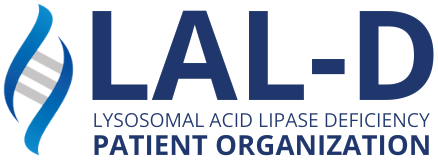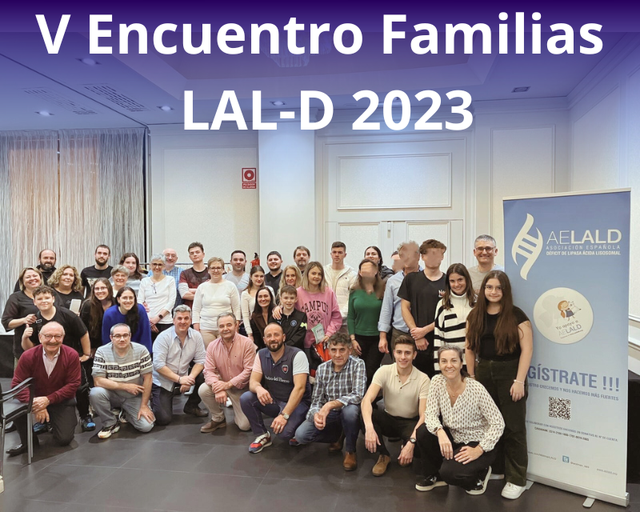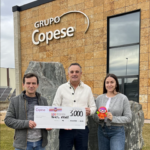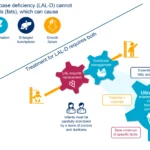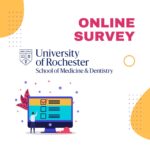This disease, considered ultra-rare and affecting only 45 people in Spain, is also known as Wolman’s Disease or Cholesterol Ester Storage Disease.
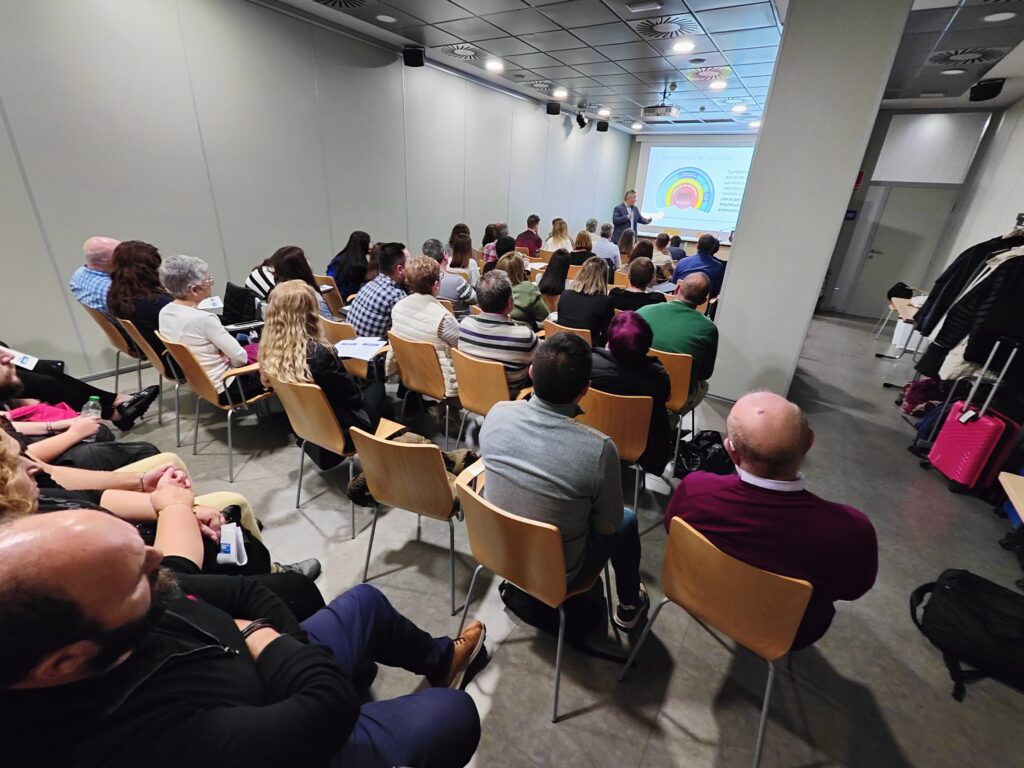
Lysosomal Acid Lipase Deficiency (LAL-D) is an autosomal recessive metabolic storage disorder based on the accumulation of cholesterol esters and triglycerides in the cellular lysosome. This disease is characterized by multiple organ systems, including the liver, spleen, cardiovascular system, and, to some extent, the gastrointestinal system. LAL-D presents in two distinct phenotypes. Wolman’s disease, which exclusively affects infants and is fatal, with death usually occurring within the first 12 months of life. Cholesterol Ester Storage Disease (CESD), the other phenotype, manifests less rapidly and affects both children and adults. Unfortunately, once symptoms develop, a significant percentage of patients may experience progression of liver fibrosis to cirrhosis or the need for a liver transplant within 3 years of symptom onset.
The exact frequency of the disease is still not fully understood. Various studies have provided prevalence estimates ranging from 1 in 130,000 to 1 in 300,000 people.
The Spanish Association for Lysosomal Acid Lipase Deficiency (AELALD) was founded in January 2015 by the parents of a 3-year-old girl diagnosed with this disease. The association’s goals are to care for, unite, and provide guidance to affected individuals and their families, to promote the widest possible dissemination of information to aid in the diagnosis of new patients, and to promote research into the disease.
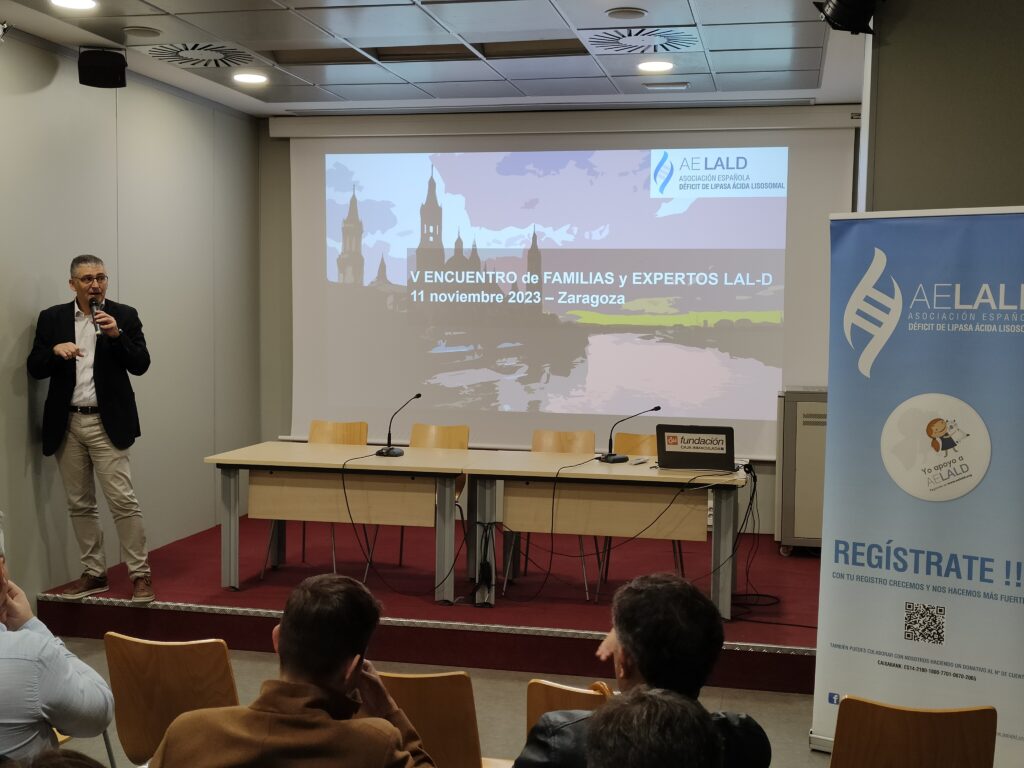
V Meeting of LAL-D Experts and Families in Zaragoza: Advances and Solidarity
On November 10 and 11, 2023, the V Meeting of LAL-D Experts and Families was held in Zaragoza. This meeting brought together healthcare professionals, researchers, patients, and their families to share knowledge and experiences, and explore new horizons in the understanding and treatment of this ultra-rare disease.
The V Meeting of LAL-D Experts and Families stood out as a unique space where clinical expertise, scientific research, and the life perspectives of affected families merged. The event addressed a variety of topics, from medical advances to the daily challenges faced by patients and their loved ones.
Research and Medical Advances
The meeting presented the latest research on ALL-D by the Expert Committee, which has been working for years to increase knowledge about this underdiagnosed disease, highlighting advances in understanding the disease at the molecular level. The scientific community shared promising data from publications and discussed the possibility of improving patients’ quality of life.
Family and Patient Experiences
The event also served as a platform for families to share their daily experiences and challenges. This exchange of personal stories created a unique bond among attendees and helped highlight the importance of a comprehensive approach that not only encompasses the medical aspects, but also the emotional and social aspects of the disease.
Commitment to the Future and Hope
The exchange of knowledge and the vision of a better future for those affected by this rare disease were well received by the participants. With the sustained commitment of the medical community, researchers, families, and patients, future scientific advances and improvements in the quality of life of those facing ALL-D are anticipated.
Exploring Hope: Research at the FEETEG Foundation
Families affected by LAL-D visited the FEETEG Foundation, led by Dr. Pilar Giraldo and her team, who are conducting projects to further understand the condition. Your contribution, both in your presence and through blood samples, is essential to advancing research. Dr. Giraldo’s team works tirelessly in the laboratory, analyzing samples to unravel the genetic and molecular mysteries of the disease. The courageous participation of families represents a significant step in the search for answers and solutions that can change lives.
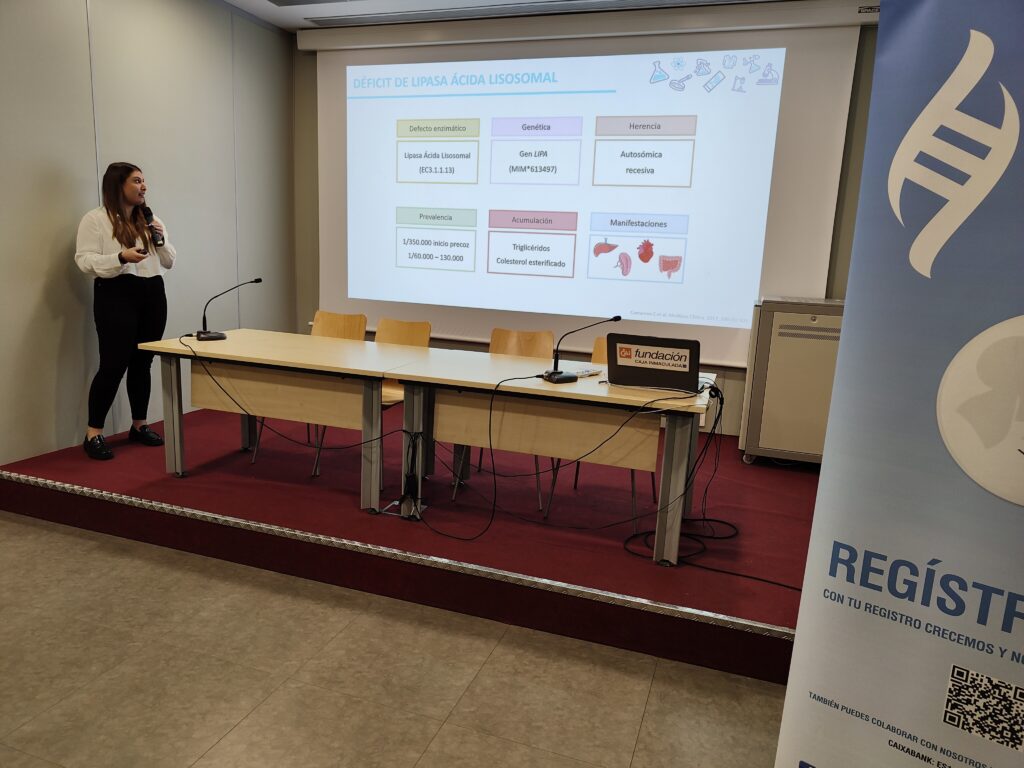
Irene Serrano, a predoctoral researcher at the University of Zaragoza and member of the FEETEG team, not only offered an in-depth look at ongoing research projects in her talk to families, but also highlighted the critical importance of the samples that are now part of the invaluable biobank dedicated to LAL-D.
In highlighting the importance of the biobank, Irene Serrano emphasized the crucial role each sample plays in the search for answers. By contributing these samples, families have woven a network of solidarity that drives research and brings the community one step closer to the possibility of significant breakthroughs.
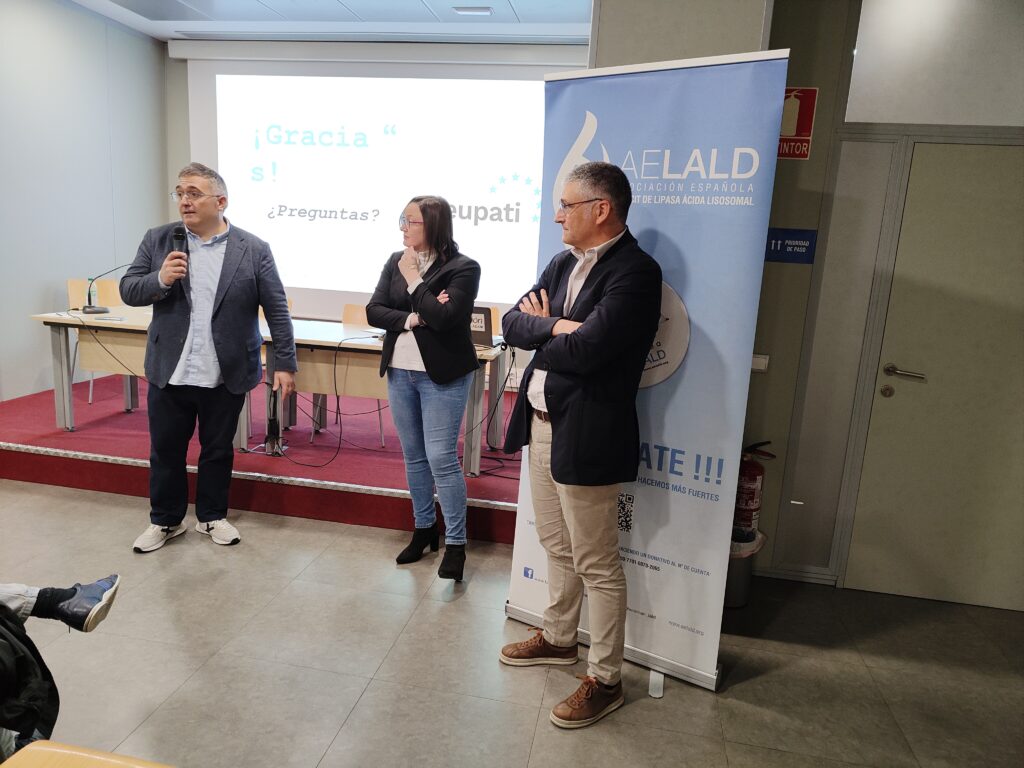
Fátima Rodríguez and David Trigos, representatives of EUPATI Spain, addressed the fundamental rights, responsibilities, and needs of patients in healthcare. Rodríguez highlighted the importance of empowering patients, underscoring the need to understand and exercise their rights for equitable care. Trigos delved into patients’ responsibilities, emphasizing active collaboration in their own care and the importance of continuing education in health management. Both highlighted needs ranging from access to information to inclusion in research processes. Their talk inspired the audience to consider collaboration as key to a more equitable and patient-centered healthcare system.
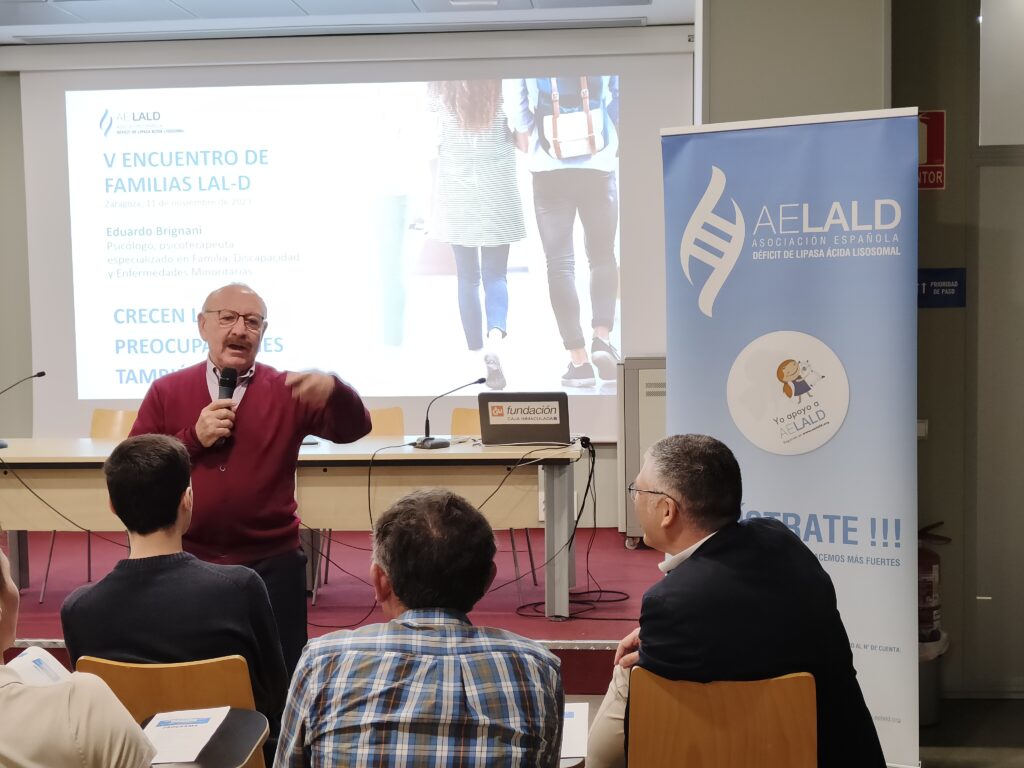
In a powerful presentation, Eduardo Brignani, a psychologist specializing in rare diseases, explored the emotional complexities of adolescence and the transition to adulthood in patients with LAL-D. Titled “Worries Grow Too,” he addressed everyday concerns and specific challenges at different stages of development. Brignani provided practical tools to support patients, highlighting the importance of a holistic approach that considers both medical health and mental and emotional well-being. His talk was a poignant reminder of the need to address concerns from a holistic perspective in the development of patients with LAL-D.
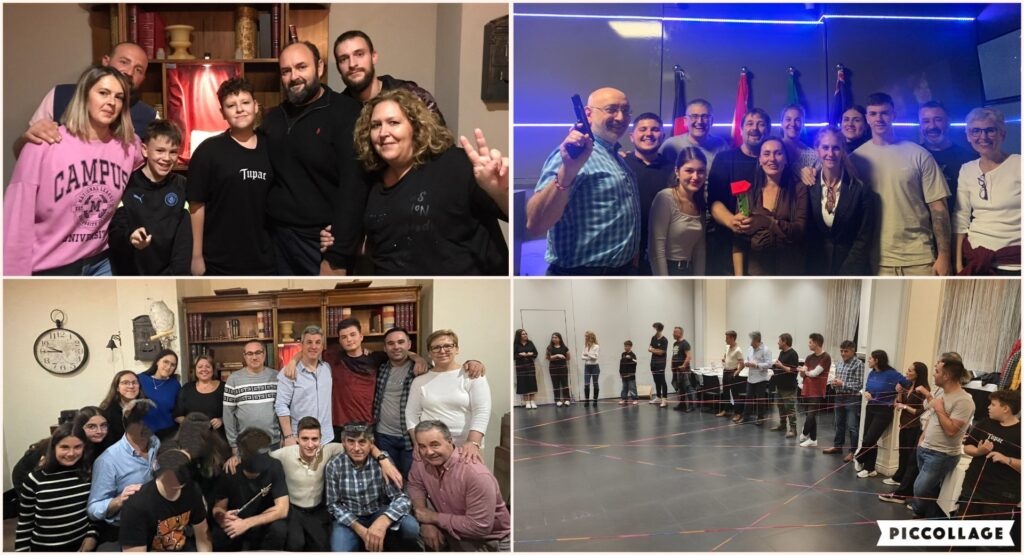
After the morning information session, participants enjoyed a shared meal. In the afternoon, family-building activities included teamwork and collaborative games. This time not only enriched the event experience but also established a network of support and solidarity, creating valuable memories among the families in attendance.
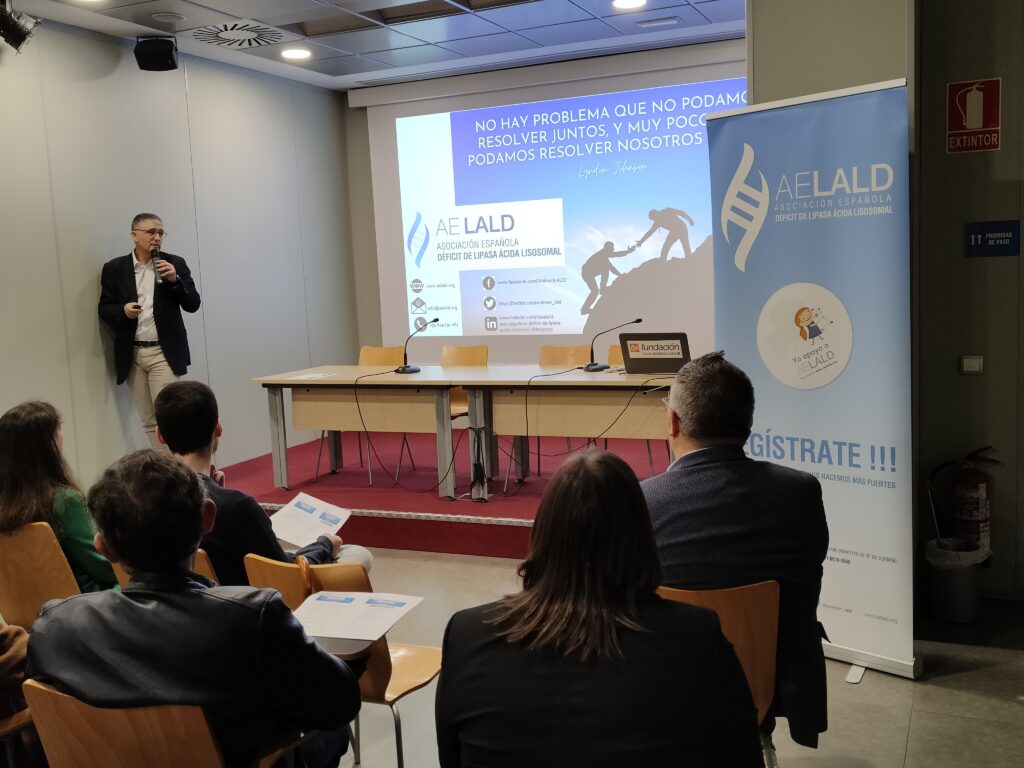
For Eduardo López, the importance of this conference lay in the opportunity to connect all affected patients and their families with each other, with the goal of creating a close-knit and coordinated group to further disseminate knowledge about this serious disease and, of course, to seek sufficient financial support to initiate lines of research that will lead to a cure for the disease in the coming years.
The only current pharmacological treatment delays the progression of the disease in those affected. Therefore, Eduardo believes it is crucial to continue researching this pathology to gain deeper knowledge and, eventually, find a cure.
LAL-D EXPERT COMMITTEE MEETING
In parallel with this meeting, the day before the 5th Family Meeting, a special session with experts on the disease was held. This recurring meeting featured the participation of professionals from various disciplines, including medicine, biology, nutrition, and artificial intelligence. The synergy between these experts provides a comprehensive and multidisciplinary approach to addressing the disease, fostering research and continuous improvement in medical care.
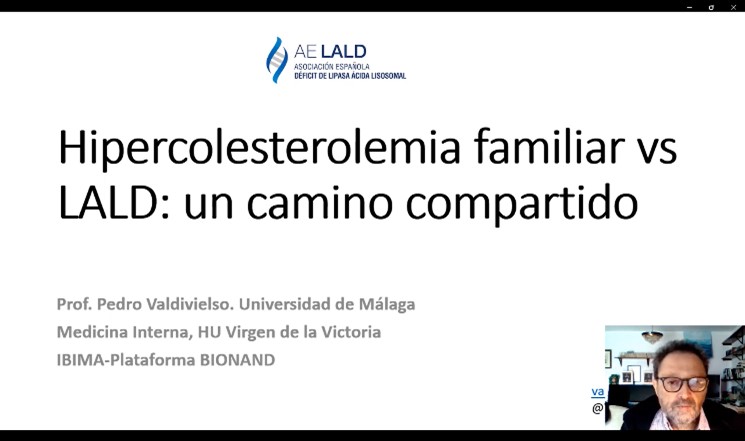
Dr. Pedro Valdivielso, from the Internal Medicine Department of the Virgen de la Victoria University Hospital in Malaga and Professor of Medicine at the University of Malaga, gave a presentation entitled Familial Hypercholesterolemia vs. Lysosomal Acid Lipase Deficiency (LAL-D).
Familial Hypercholesterolemia (FH) and Lysosomal Acid Lipase Deficiency (LAL-D) are metabolic disorders, but they differ in origin and effects. FH, of genetic origin, raises cholesterol from an early age, increasing cardiovascular risk. In contrast, LAL-D, an enzyme deficiency, affects lipid breakdown, manifesting with liver symptoms. Although distinct, both emphasize the need for early diagnosis and appropriate management to avoid complications.
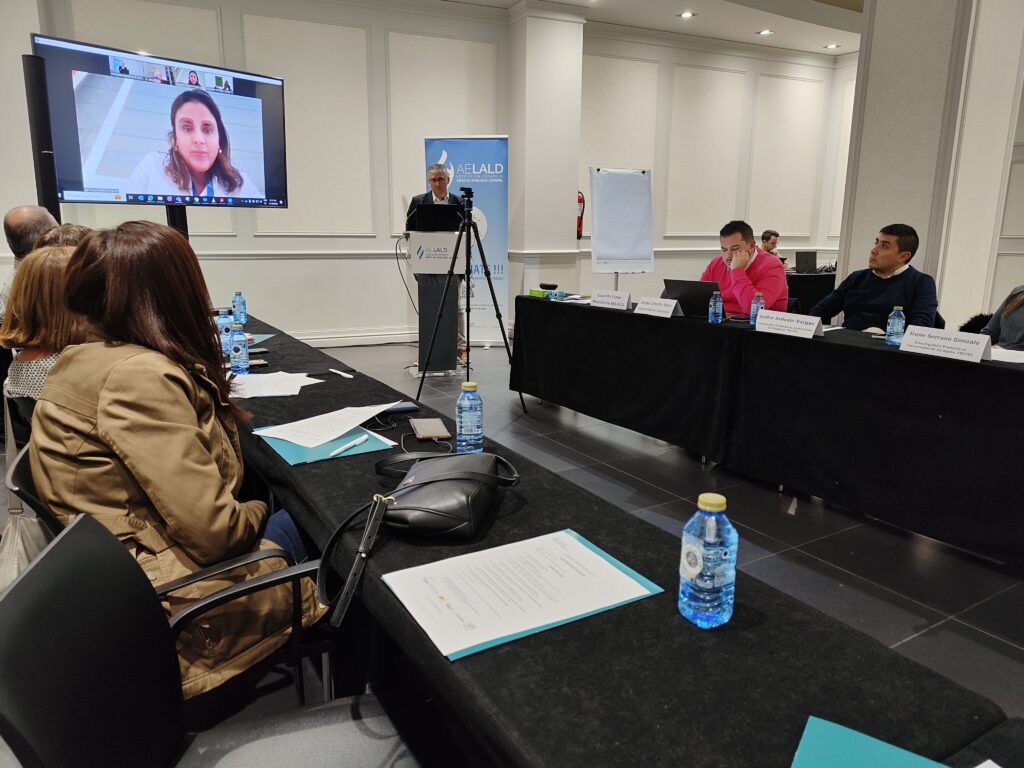
Dr. Raquel Yahyaoui, a Clinical Biochemist and Clinical Laboratory Geneticist (EBMG), with accreditation in Human Genetics (AEGH) and practicing at the Regional University Hospital of Malaga and IBIMA-BIONAND Platform, gave a presentation on the current status of newborn screening worldwide and in Spain.
Neonatal screening, essential for the early detection of treatable diseases in newborns, varies in its global reach. Worldwide, the diversity of programs and resources affects the uniformity of screening. In Spain, significant progress has been made, with well-established regional programs and protocols covering a spectrum of disorders. Collaboration between communities and the implementation of improved technologies are helping to strengthen the effectiveness of newborn screening in Spain, ensuring early detection and timely treatment.
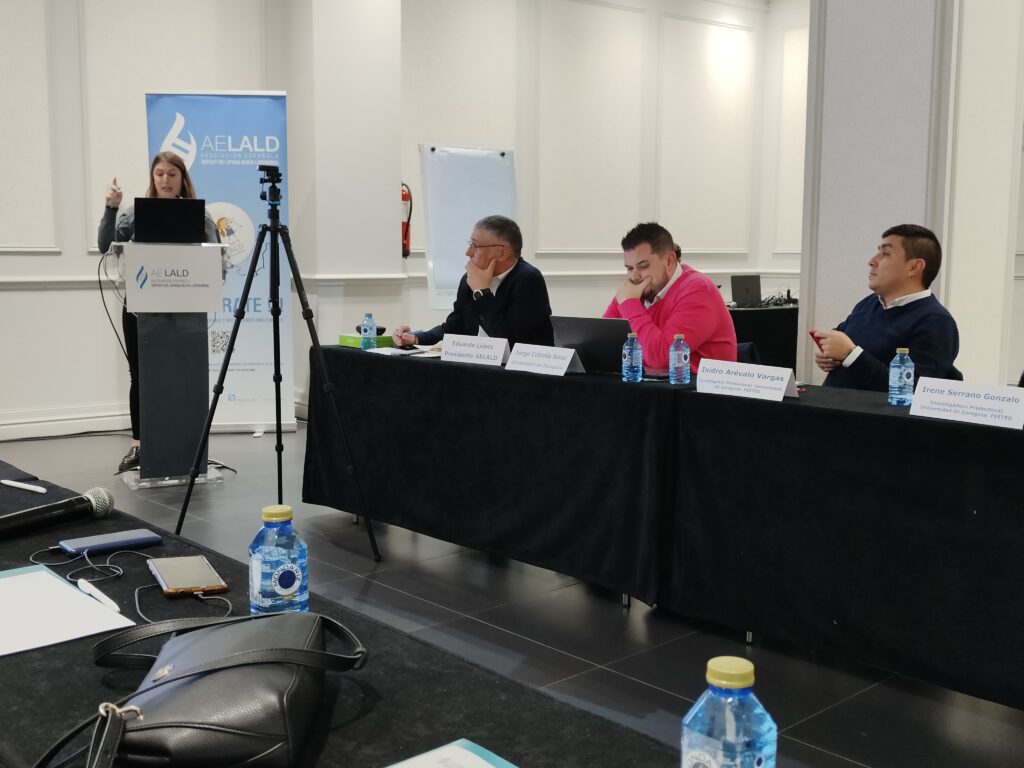
Irene Serrano, a predoctoral researcher at the University of Zaragoza and member of the Spanish Foundation for the Study and Treatment of Gaucher Disease and Other Lysosomal Diseases (FEETEG), gave a presentation related to the search for new biomarkers in patients and carriers of ALL-D.
The search for new biomarkers in patients and carriers of ALL-D is a key area of research. These biomarkers could offer valuable insights into disease progression and treatment response. Advancing this search not only improves our understanding of ALL-D but may also pave the way for more precise and personalized approaches to the diagnosis and management of this metabolic condition.
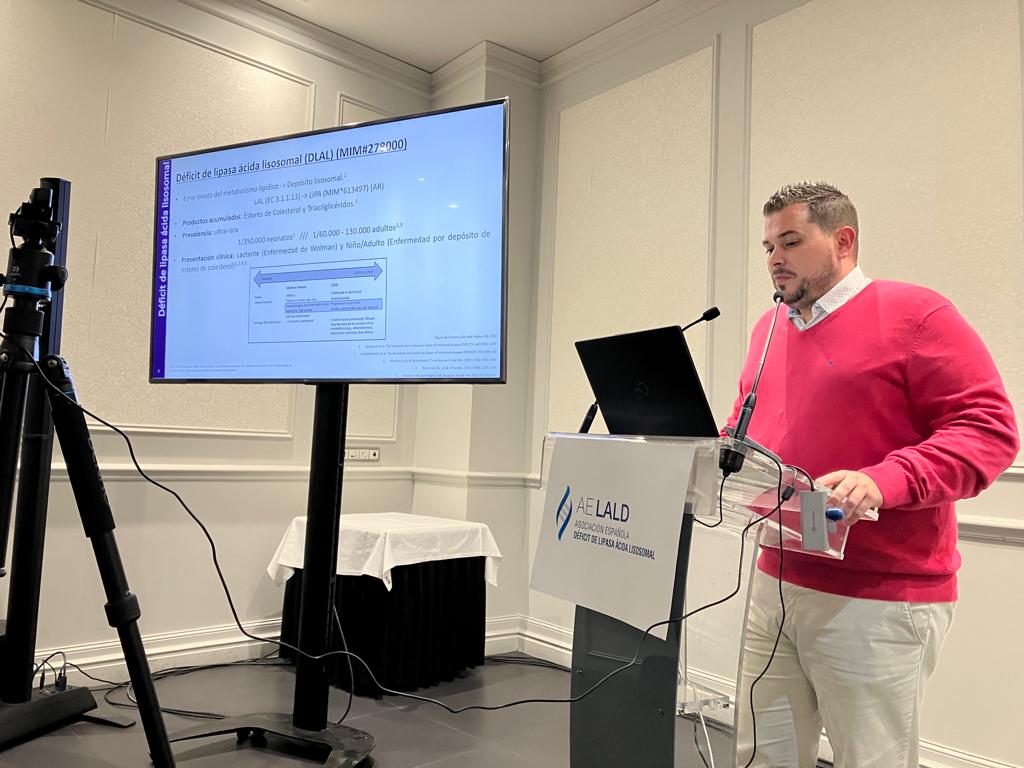
Dr. Jorge Cebolla, from the University of Zaragoza, gave a presentation entitled “Review of the Association between Lysosomal Acid Lipase Deficiency and Malignant Lymphohistiocytosis.”
This review of the association between ALL-D and malignant lymphohistiocytosis seeks to understand the possible relationship between these two phenomena. Current research is exploring whether lysosomal acid lipase deficiency may be linked to the development of malignant lymphohistiocytosis, offering crucial insights into the understanding and management of both conditions.
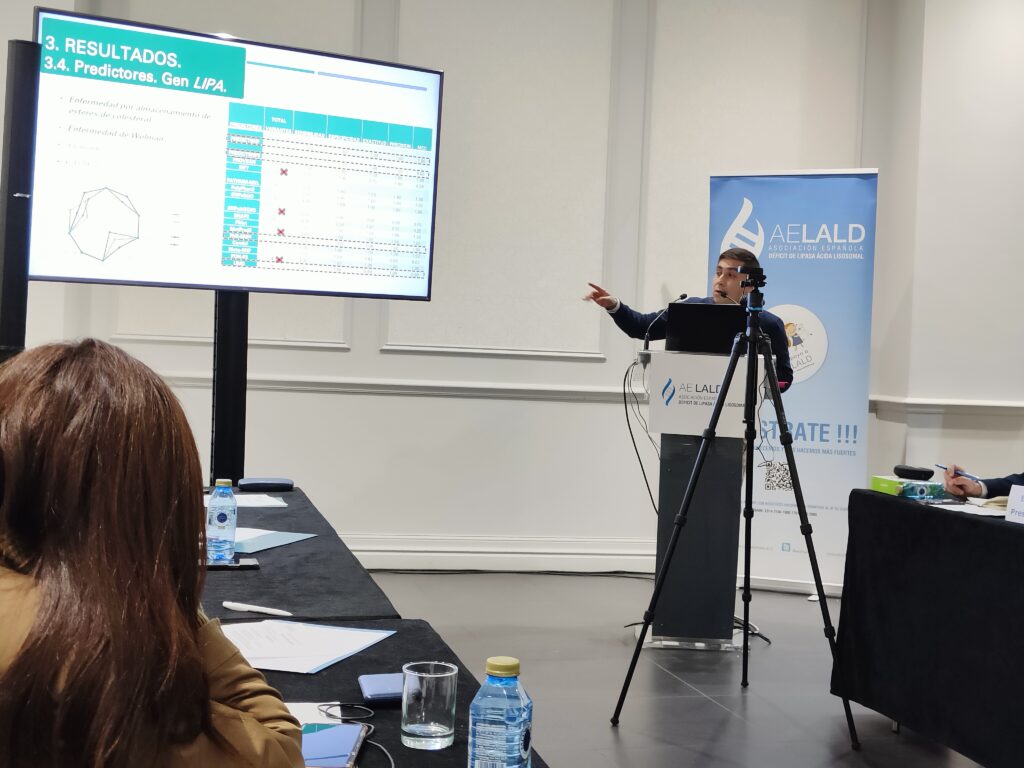
Isidro Arévalo, a predoctoral researcher at the University of Zaragoza and member of the FEETEG team, gave a presentation on the study “Evaluation of Predictors Related to Genetic Analysis in ALL-D.”
The evaluation of predictors related to genetic analysis in ALL-D seeks to identify genetic markers that can predict the presence or severity of the disease. This approach has the potential to improve diagnostic accuracy and facilitate earlier and more personalized interventions in patients with ALL-D, thus contributing to more effective and patient-centered care.
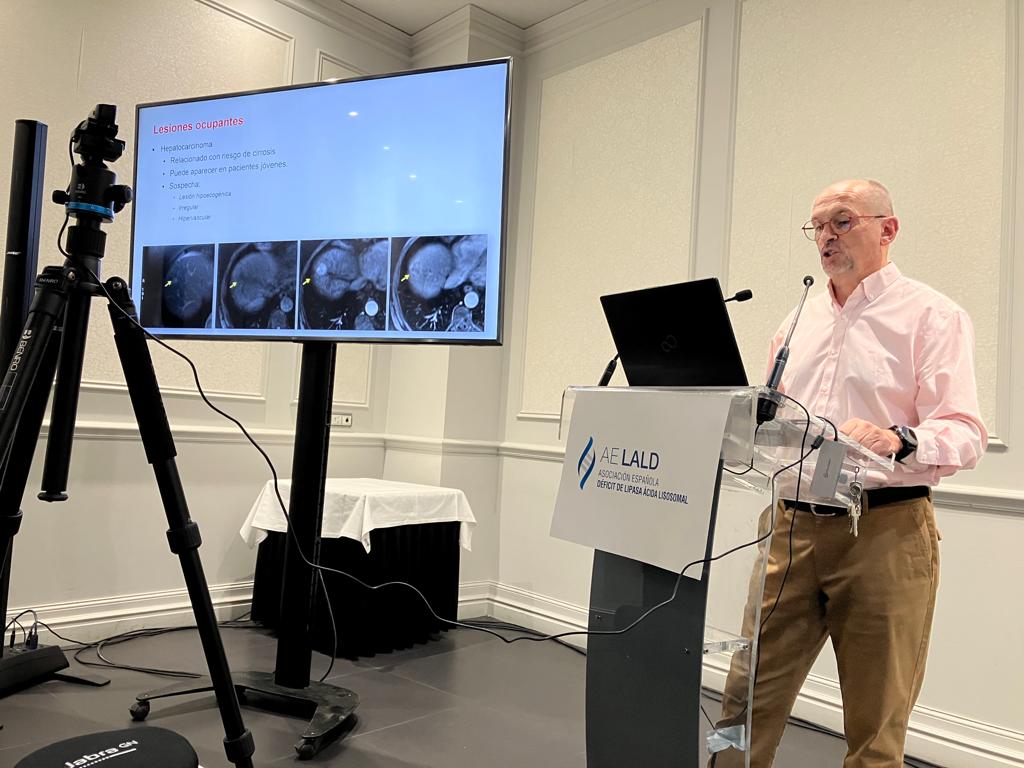
Dr. Luis Sarría, Head of the Radiodiagnostic Section at the Miguel Servet University Hospital in Zaragoza, performed an evaluation of hepatic deposits in lysosomal diseases using imaging techniques.
The evaluation of hepatic deposits in lysosomal diseases using imaging techniques is crucial for understanding the progression and severity of these conditions. Imaging techniques, such as magnetic resonance imaging and computed tomography, allow for precise visualization of the accumulation of abnormal substances in the liver, providing valuable information for the diagnosis and monitoring of lysosomal diseases. This approach not only improves clinical understanding but also facilitates decision-making in the treatment and management of these liver diseases.
